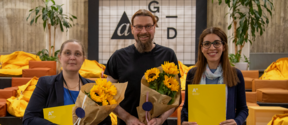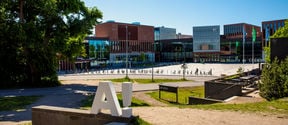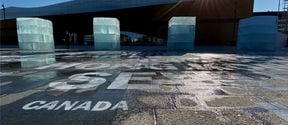Researchers need a child-like mind and plenty of guts
Microrobotics is an important force, even a revolutionary one, says Professor Zhou. Photo by Anni Hanén.
Professor Quan Zhou, what do you research and why?
My field is micro- and nanorobotics, so I develop machines that work with things so small that if you really strain your eyes, you can just about see them as tiny specks. This is fascinating from the physics perspective because when working on the scale of bacteria and cells the forces behaves very differently. The work is therefore challenging – but also really fun.
Microrobotics is an important force, even a revolutionary one, in many practical fields of application. One of these is the manufacture of microscopically small components needed, for example, in optical systems and microelectronics. Another significant field of application is biotechnology; microrobotics can be used to move cells or insert substances such as medicines into them.
How did you become a researcher?
I have always appreciated critical thinking. My childhood environment was also certainly of great importance: my mother was a professor of wireless telecommunication, my father a mathematician, and my uncle a professor of fluid mechanics. Research felt like a natural option – my sister also works as a professor, at Harvard University.
What have been the highlights of your career?
One of them was when the research project I coordinated was selected in first place for the EU’s European Economic Recovery Plan. Another was when we made a breakthrough in the movement of objects using music and our work was published in the scientific journal Nature Communications. The same type of acoustic experiments has been carried out for over two hundred years, but we discovered the regularity from the rather chaotic phenomena, and achieved a new record in the number of separate movements that can be controlled with a single sound source.
What are the most important qualities for a researcher?
There are two of them: curiosity and perseverance. A researcher must have a child-like mind; the ability to see things that others don’t notice. Perseverance is needed for daring to keep hold of one’s ideas and carry them forward.
What do you expect from the future?
The future looks bright, and I'm looking forward to it with excitement. The tenure gives me more freedom to take my research into new, multidisciplinary areas. For example, I would like to introduce more automation into physics or biology related research to increase both their quality and speed. But I am open to any crazy ideas that will spring up during the course, if they are important scientifically or in applications.
Quan Zhou's profile at Aalto People
Quan Zhou and the other recently tenured professors at Aalto University will present their research in the multidisciplinary afternoon starting at 14.15 on 15 March. We hope to see you there!
See the lecture programme here
- Published:
- Updated:
Read more news

Aalto Open Science Award ceremony brought together Aaltonians to discuss open science
Last week we gathered at A Grid to celebrate the awardees of the Aalto Open Science Award 2023 and discuss open science matters with the Aalto community.
Seed funding available to boost collaboration between Aalto, KU Leuven and University of Helsinki
Aalto University, KU Leuven and the University of Helsinki launch the 2nd exploratory seed funding call to explore research collaboration possibilities. The funding call is open until 10 September 2024.
Professor Peter Hans Matthews works as a Fulbright-Aalto Distinguished Chair scholarship holder at the Department of Economics
Fulbright programmes and scholarships are highly appreciated in the United States